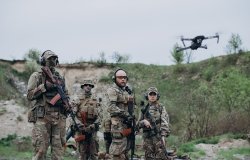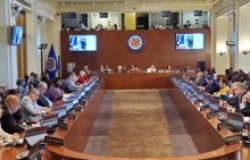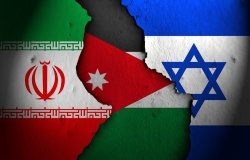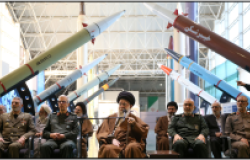Discussion - The West and The World After Iraq
With Pierre Hassner, Professor Emeritus of Political Science at the Institut d'Études Politiques of Paris
Overview
On Friday, November 16th the West European Studies Program along with East European Studies and the Division of International Security Studies hosted a discussion with Pierre Hassner, Professor Emeritus of Political Science at the Institut d'Études Politiques of Paris on The West and the World After Iraq. During the discussion Hassner offered insight into whether western allies can develop a more cohesive approach and common security policy in dealing with current threats to transatlantic security.
In his opening remarks Hassner stated that the western alliance continues to deal with a deep crisis and lack of cohesion in addressing some of the world's most pressing international security issues including a slide in recent years towards a more authoritarian Russia under Vladimir Putin, the continued threat of global terrorism, as well as recent tensions within the Middle East and South Asia. He referenced recent papers addressing similar concerns over the alliance's cohesion including that of Bulgarian writer Ivan Krastev, who notes that "the world can rarely agree on anything anymore but being anti-American." As another example of the new pessimism among many analysts, Hassner cited Robert Kagan's article End of Dreams, Return of History in Policy Review, August- September 2007 edition as a further example of a belief in a fundamental difference existing among members of the western alliance in confronting global crises'. Hassner asks the question "How can these issues be reconciled?"
Pierre Hassner believes that we are now in a little understood third phase of the post Cold War period which he describes as post 9/11. He states that the concept of a post Cold War world in which the ideas of liberal democracy and freedom would become universal, as espoused by Francis Fukuyama in The End of History, have not come to pass as many had imagined. The current post 9/11 phase is much more brutal, and western policies must be changed accordingly. Hassner also believes that the continued surge in Islamic extremism, the threat of increased nuclear proliferation with states such as Iran, and the rise of China as a global power will continue to change the international landscape drastically in the coming decades.
Hassner went on to illustrate two long-range factors in the international arena that will continue to test the alliance's cohesion and effectiveness. This includes the increased capacity of non-state actors to affect the world as well as the explosion of global instant communications and technology. Hassner pointed out that in the 21st century groups such as Al-Qaeda have co-opted global communications systems developed by the West to advance their own agenda around the globe. He also stated with news moving around the world almost instantly through the internet and satellite television there has also been a globalization of hatred and resentment towards the West, particularly the United States.
Additionally, Hassner described how the Iraq War has significantly reduced the idea of unlimited American power and legitimacy. Since the March 2003 invasion the United States is no longer in the power position that it occupied throughout the 1990's. The symmetry of American power has decreased with the rise of Islamic fanatics who "don't play by western rules of engagement," and this has led to a further reduction in this power. The Iraq War, according to Hassner, has done much reduce the idea of American benevolence in, not only the Middle East, but among western populations as well while simultaneously giving greater influence to states such as Iran, Syria, and Venezuela.
Finally, Hassner stated that the West needs a much more subtle and long-term strategy in dealing with issues of non-proliferation, democratization, and terrorism. Specifically referencing the current problem with Iranian nuclear development, Hassner described how many analysts believe that an Iranian theocratic regime obtaining nuclear capabilities would be catastrophic due to the fear of this technology being passed on to radical Islamic groups and other non-state actors. Hassner also warned that the Non- Proliferation Treaty has lost credibility outside the western world as states such as India and Pakistan have gained status after their successful development of nuclear weapons in the 1990's.
Hassner concluded his remarks with a warning that a military first strike in the Iranian case will not be as effective or as easy as many western analysts would lead the public to believe. Additionally, a strike by the United States or allies might even be counterproductive for the West as warfare itself has moved from a classic territorial control style towards a need to control the society in general as seen recently in Iraq. Quoting the United States Ambassador to Somalia Robert Oakley, " If you liked Beirut you will love Mogadishu," Hassner declared that the same might be said for Baghdad and Tehran if the United States pursues the military option.
Drafted by Matt Starling
Hosted By

Global Europe Program
The Global Europe Program is focused on Europe’s capabilities, and how it engages on critical global issues. We investigate European approaches to critical global issues. We examine Europe’s relations with Russia and Eurasia, China and the Indo-Pacific, the Middle East and Africa. Our initiatives include “Ukraine in Europe” – an examination of what it will take to make Ukraine’s European future a reality. But we also examine the role of NATO, the European Union and the OSCE, Europe’s energy security, transatlantic trade disputes, and challenges to democracy. The Global Europe Program’s staff, scholars-in-residence, and Global Fellows participate in seminars, policy study groups, and international conferences to provide analytical recommendations to policy makers and the media. Read more
Thank you for your interest in this event. Please send any feedback or questions to our Events staff.










